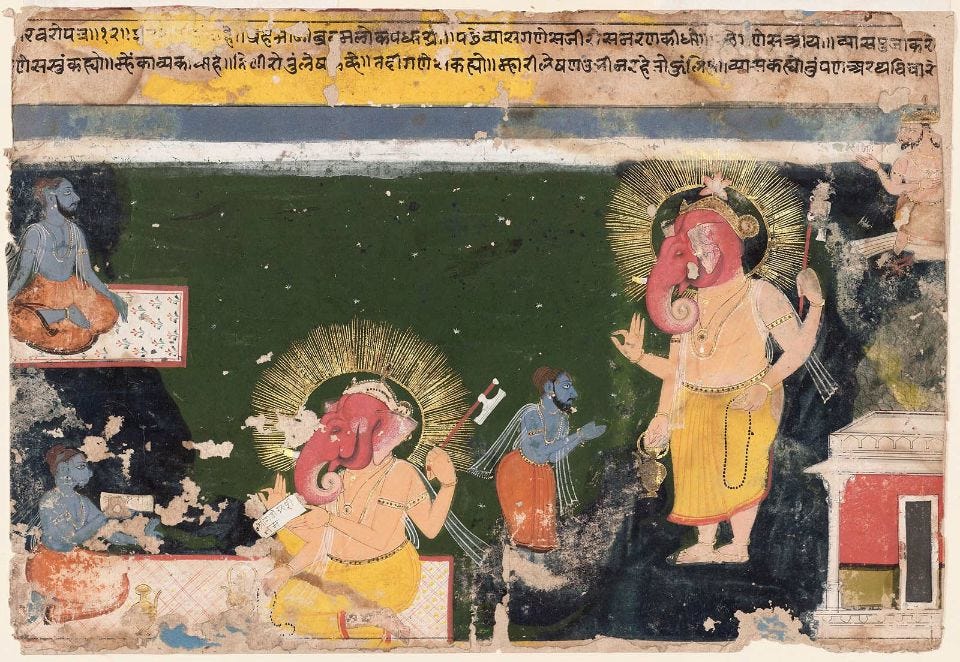Jayary Newsletter # 86

Keystones
I believe that rishis are the keystone species of the Jaya. What's a keystone species? It's a species whose impact on its environment is disproportional to its abundance. Jaguars are keystone species. It goes without saying that humans are a keystone species. Factoid: we are about .00018% of all non-marine biomass but are responsible for 20% of global primary production, i.e., the volume of life produced per year on earth. That's a million to one ratio. With a baseline of seven billion humans we aren't just another keystone species, but an alpha keystone species.
Rishi's aren't that abundant.
There are the superstar rishis like Vashistha and Vishwamitra, and the lesser lights such as Lomasha, but even if you add in the local heros, there are no more than a thousand rishis in the directory.
However, rishis uphold the world. They invented the sacrifice and teach it to others. Without sacrifice there's no heaven. The gods depend on the rishis. But the rishis aren't the usual divinities. How do you explain a being who drinks up the ocean one day and goes begging for lunch money the next day?
You can see how the Buddha takes the rishi prototype to its logical conclusion - he's more enlightened than the gods, whose penchant for luxury is their undoing. He's poorer than a beggar, though by choice rather than circumstance. With the Buddha, humans can expel the gods to another world and become the upholders of the dharma.
I am convinced the transition from the devas to the buddhas hasn't been understood yet; in it are the seeds of an entirely different modernity than the one we currently inhabit. But we can't get there without understanding the rishis.
So what's Agastya like? What is is like to be Agastya?
Who's Agastya?
I guess we could trace his genealogy, find out who his parents were and the miraculous conditions in which he was born. That won't tell us much, for his ancestors will be as opaque to us as he is. It's always good to situate a person or an event in its context, but that's only when the context is familiar. The background information only confuses us when the context unfamiliar.
For example, Kolakowski starts his book on Marxism by saying "Marx was a German Philosopher." That's a useful insight if you know something about German philosophy between Kant and Hegel; in particular it tells you that the universal claims of Marxism originate within a certain cultural milieu. If you have no idea about German philosophy (somewhat unlikely for a person cracking open K's book), you're going to put down Kolakowski's book, exclaim "what, now I have to learn German philosophy as well!" and get back to reading the latest Chetan Bhagat thriller.
So I am not going to inquire into Agastya's antecedents. Instead, let's ask a different question: what did he look like? Was he handsome? Ugly? Tall? Squat?
I am thinking the digestor was short, burly and blunt. He reminds me of Socrates who was famously ugly. Plus, he works well with the daityas when he isn't eating them. So let's assume that Agastya is a charismatic eyesore.
The Socratic Rishi
OK, we agree - and what I really mean is I have decided and you have no choice in the matter - that Agastya is a satyric figure. Blunt nosed, fierce eyed. There's aggression in him even when he's being kind. Someone you don't want to encounter in a dark alley on a new moon night. Not because he will rob your wallet, but because he will steal your soul.
Why bother with the dark alley - the great rishi can scramble brains in broad daylight. Like Socrates, who was killed for corrupting the minds of Athenian youth.
What else?
I want to milk the analogy to Socrates further. With good reason, for Plato's teacher was a Greek rishi wasn't he? A rishi with a biography: son of a midwife, a soldier in his youth, lover of wisdom and young men and the first martyr to reason. Short as they are, these details add context to Socrates' life. Unlike Agastya, whose past adds to our bewilderment.
It's not a Greek vs Indian thing, by the way. There are enough details about the Buddha's life too: that his mother died soon after his birth, that he was a good warrior, winning his bride through his skill at arms and so on.
But I don't see the Buddha in Agastya. I see Socrates. So let's continue sketching out Agastya's life shall we?


